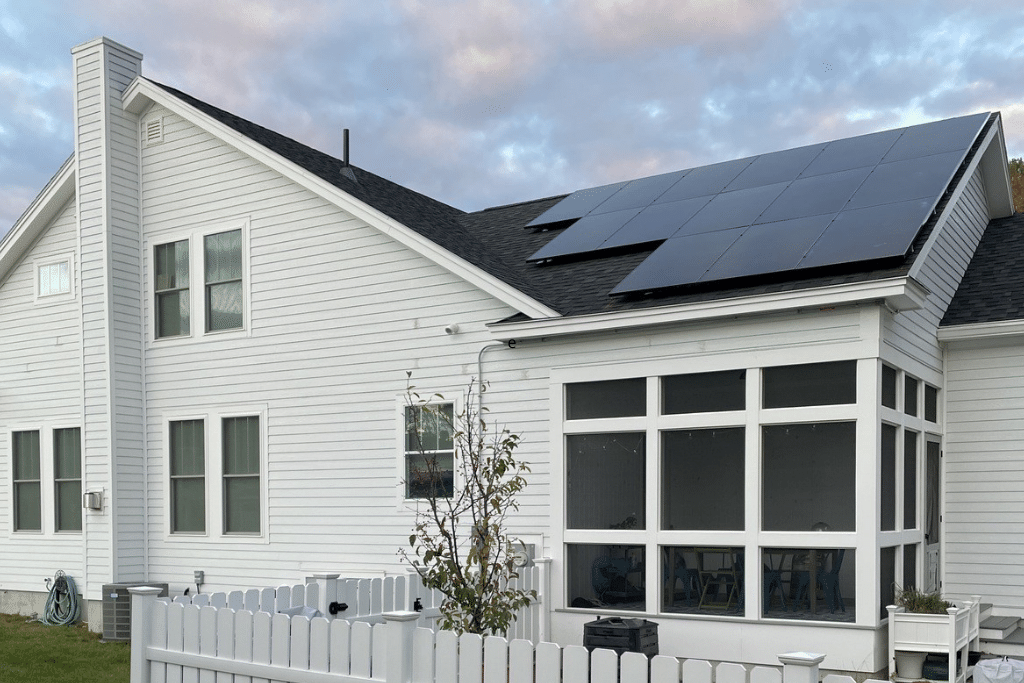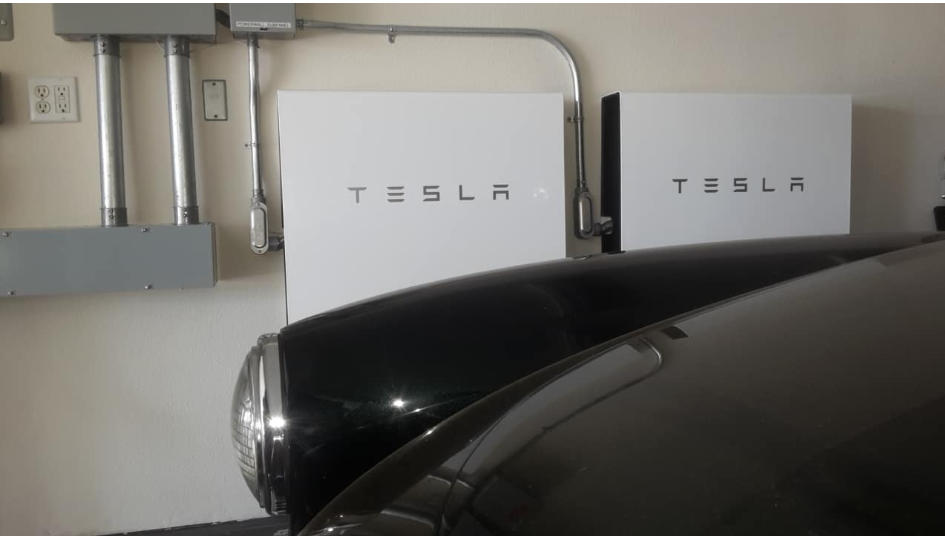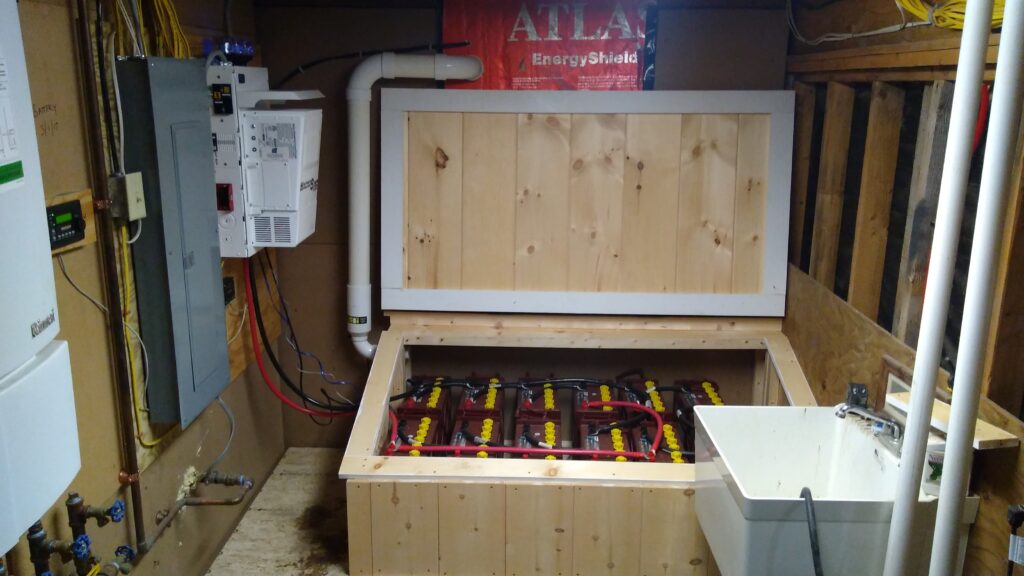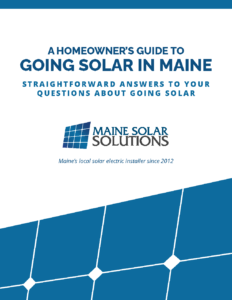The Average Cost to Install Solar In Maine
The average home in Maine uses between 8,000 kWh and 12,000 kWh of electricity per year. The cost for a grid-tied, rooftop solar electric system designed to cover this electricity usage would have a direct purchase price between $24,162 and $29,697. Once the 30% tax credit is factored in, the net purchase price would range between $16,913 and $20,788.
| If Your Bill Is | Annual Electric Usage* | Solar Array Size | Estimated Solar Purchase Price** | Net Cost After 30% Tax Credit |
|---|---|---|---|---|
| $155 | 6,431 kWh/yr | 5.0 kW array | $17,124 | $11,987 |
| $225 | 9,646 kWh/yr | 7.5 kW array | $24,162 | $16,913 |
| $295 | 12,862 kWh/yr | 10.0 kW array | $31,014 | $21,710 |
| $365 | 16,077 kWh/yr | 12.5 kW array | $38,199 | $26,739 |
(*)You can find how much energy you use on your electric bill.
(**) Pricing estimates assume an unshaded, south-facing roof with a 35-degree roof pitch.
Production levels and costs will vary depending on your free site assessment findings.
What Type Of Solar Electric Systems Are Available?
The average system costs noted above are for a grid-tied, roof-mounted solar electric system. Grid-tied, rooftop solar systems are our most common type of solar electric system installed throughout Maine.
However, other solar system options are available, such as grid-tied, grid-tied + battery backup, off-grid battery-based systems, and ground mounts. To ensure you get the information you need to make an informed decision about what type of solar system will work best for you, we have outlined the options available below.

These are the most common type of solar electric systems in Maine. With this system, your home can be powered by the sun when it is shining. You are still connected to your utility provider (often called the grid), so you still have power when sunlight is unavailable. Net Metering allows the electricity generated by your solar system to offset the electricity used from the grid during the night or on cloudy. This ensures that all of the electricity your system produces offsets your usage and ultimately your electric bill. However, if the grid goes down, your system will shut off, and you will lose power. Grid-tied systems are the less expensive option due to not needing batteries and other additional equipment.

Installing a grid-tied solar electric system is an excellent step towards energy independence. However, during a power outage, your system does not provide power. By pairing a grid-tied solar electric system with battery backup, you can bank the energy you produce for times when you need it, like when the grid goes down. Although whole-house backup is achievable, most grid-tied battery backup systems are designed only to power “critical” electrical loads. If you are thinking about going solar now but want to add batteries in the future, we can design your system to accommodate your future battery needs. These systems are more costly than grid-tied alone.

Many people like the idea of installing an off-grid solar system because of its independence. However, it could require a lifestyle change to reduce energy consumption as you cannot rely on the grid. These systems tend to be most popular in rural locations such as camps or where the nearest power line may be miles away. You will need batteries to store your energy, must monitor the battery health, and be aware that you have a finite amount of energy you can collect and store on a daily basis. These systems have special design and operation requirements making them more challenging to install and service than a more common grid-tied system. They also require more components and usually cost more. Maine Solar Solutions has a design and installation team experienced with off-grid solar systems if you would like to learn more.
Rooftop Solar Versus Ground Mounted Solar
There are two common types of solar panel installations for grid-tied solar systems: roof-mounted and ground-mounted.
Most of the solar electric systems installed in Maine feature rooftop solar arrays. But sometimes aesthetic concerns or heavily shaded roofs make consideration of a ground-mounted solar array advisable. Ground-mounted solar arrays typically cost between 15 – 25% more than rooftop solar arrays. The expense of ground anchors, racking, and trenching accounts for this higher cost. Although a ground-mounted solar array costs more than an equal-sized rooftop array, many of our customers have found that a ground-mounted array provides the best balance of cost, aesthetics, and value. Our experienced solar consultants can show you the relative costs of both options and help you determine what makes the most sense.
The Homeowner’s Guide to Going Solar In Maine
Download your free eBook!
This free resource is packed with answers to the most common questions we receive about solar energy installations in Maine.
What Factors Affect The Cost Of A Solar Electric System?
During your free solar site assessment, we gather information about your home that we use to design your system. We prepare a proposal based on your electricity usage and we show a couple of different solar panel options. Below is the information that we gather that helps us get you a fixed-cost system price.
What Incentives Are Available For Installing Solar?
The primary incentive available to homeowners installing solar in Maine is the Federal Solar Tax Credit (ITC). Solar electric systems installed between 2022 and 2032 qualify for a 30% federal tax credit. This tax credit is scheduled to fall to 26% in 2033 and 22% in 2034. It is currently set to expire in 2035. There’s a lot of information about the ITC out there, so to help, we gathered answers to some commonly asked questions about the federal tax credit here.
What’s Included In My Solar Electric System Costs?
Once your system is designed, and you have chosen which solar panels and optional add-ons you would like to include in your system, we prepare a fixed-cost installation contract that includes all of the equipment and labor required to install a safe, code-compliant system. Your fixed-cost solar electric system includes the following:
EQUIPMENT
INSTALLATION
CUSTOMER SERVICE AND PAPERWORK
What Are The Additional Costs Involved To Go Solar?
During our site evaluation, we may determine that your electric service or breaker panel will need to be upgraded to accommodate the solar installation. Your solar proposal will detail the cost of any additional electrical work, and the final system cost will include these costs.
What Add-ons Or Options Are Available When Installing A Solar Electric System?
Battery Backup Systems:
A grid-tied solar electric system will not provide backup power during a power outage. We offer battery systems for customers seeking to add a backup power source to their grid-tied solar electric system. The most popular battery backup system is the Telsa Powerwall. Battery systems are eligible for the 30% federal tax credit. If you’re curious about batteries, your solar consultant will review options with you. Even if you aren’t ready for batteries during your initial solar installation, your solar electric system can be designed to allow for the easy addition of batteries later.
Electric Vehicle (EV) Chargers:
With the growing popularity of electric cars, many of our solar customers are requesting the installation of an electric car charging station at their homes. Combining an electric vehicle with a solar electric system in your home allows you to fix the cost of operating your electric car and truly enables you to operate your EV as a carbon-free, renewable energy vehicle.
Is Going Solar A Good Return on Investment (ROI) In Maine?
Owning a solar electric system is one of the few investments that truly pays for itself in savings over time. A properly sized and designed solar electric system can eliminate nearly your entire annual electric bill. For most Maine homeowners, the solar electric system will pay for itself in as few as 7-10 years. Customers choosing to finance the purchase of their system may see longer payback times.
Once the system has paid for itself, a typical Maine solar system owner will only have to pay their fixed utility service charge – currently around $15 per month. Whether you pay for your solar system out of pocket or choose to finance the purchase you have essentially fixed your cost of electricity and protected yourself from ever-increasing electricity price increases!
– Cathy G., Gorham, ME
What Are The Ways To Pay For Solar Electric Systems?
Most customers choose between paying upfront for their solar electric system or financing the purchase and paying a monthly payment.
Direct Purchase: Choosing to pay for a solar electric system out of pocket will give you the highest return on your investment. You’ll own your solar panels immediately and not have to pay any interest. Many of our customers have taken advantage of low-interest rates and increasing home values to pay for their solar systems with home equity loans or when refinancing their mortgages.
Solar Loans: Financing the purchase of a solar electric system allows you to fix your cost of electricity for the lifetime of your loan. Your fixed monthly payments may at first be higher than your monthly electric bill, but over time as electricity rates go up, your monthly payments will stay the same. Maine Solar Solutions offers solar financing through Mosaic. Mosaic offers no money down, low-interest rates, and a variety of term lengths with no prepayment penalties. Additional financing options may be available through your local bank or credit union.
Other Considerations
Cost should not be the only factor when choosing a solar installation company. A solar electric system will last more than 25 years; it’s important to consider a qualified, experienced company that will provide guidance and support throughout the entire system life span. From initial consult, through installation, with ongoing support and consultation, choose a company with a proven track record. Keep in mind that solar electric systems are installed to meet the requirements of the National Electric Code and as such need to be installed by licensed electricians and qualified technicians under their supervision.
Free Solar Site Assessment
Curious to see what a solar electric system would cost for your home?
At Maine Solar Solutions, our goal is to give you the information you need to make an informed decision. Schedule an informative, free, no-obligation solar consultation with one of our knowledgeable solar consultants today and begin your path towards energy independence.

